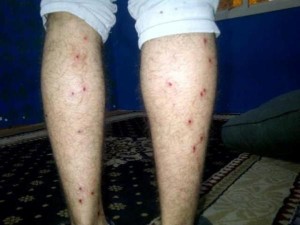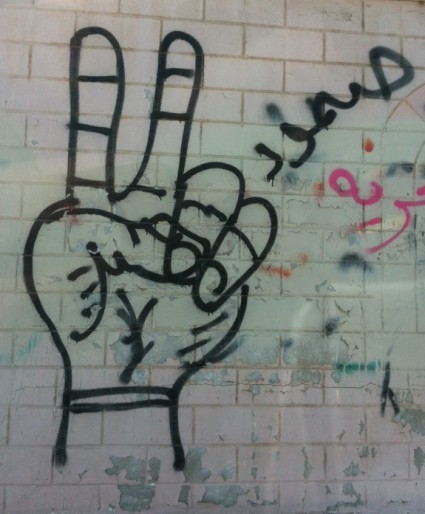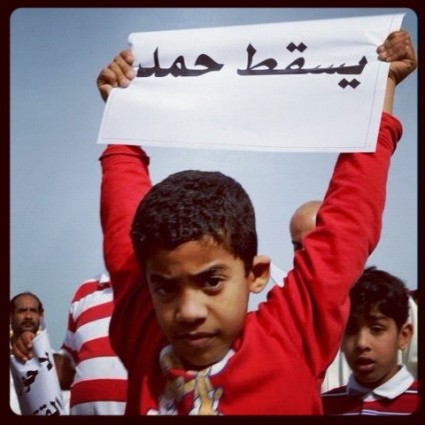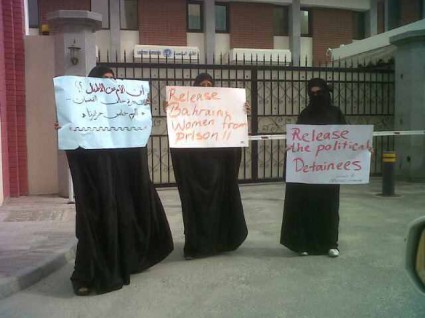Protests over unjust trials and imprisonment met with brutal response from Bahrian Regime
Bahraini forces clash with protestors over political prisoners and jailed medics
15 October, 2012 – ABNA.co
(Ahlul Bayt News Agency) – Heavy clashes have been reported in Bahrain between Saudi-backed forces and protestors who have taken to the streets to show solidarity with political prisoners and jailed medics.
Earlier yesterday, lawyers said in a statement that the five jailed medics have gone on hunger strike to urge “all international organizations to demand their release”.
“They were harshly tortured by authorities while being detained. Torture caused injuries and disabilities whose traces remain on the bodies of the medics,” the statement said.
The medics have been in prison since early October after Bahrain’s Court of Cassation, the country’s highest court upheld their sentences.
They were among twenty doctors and nurses who worked in Manama during the uprising against the Al Khalifa regime.
Reports say that the medics were given jail terms from up to one month to five years.
The Bahraini authorities charged the medical workers with using hospitals for anti-government activities, possession of weapons, and theft of medical equipment — claims they denied. The medical workers say the government is only punishing them for treating people who took part in demonstrations.
Since mid-February 2011, anti-government protesters have been staging regular demonstrations in the streets of Bahrain, calling for the Al Khalifa royal family to relinquish power.
On March 14, troops from Saudi Arabia and the United Arab Emirates were deployed to the country to assist the Bahraini government in its crackdown on the peaceful protesters.
According to local sources, scores of people have been killed and hundreds arrested in the crackdown in Bahrain.
Physicians for Human Rights say doctors and nurses have been detained, tortured, and even disappeared because they have “evidence of atrocities committed by the authorities, security forces, and riot police” in the crackdown on anti-government protesters.
A report published by the Bahrain Independent Commission of Inquiry in November 2011 found that the Al Khalifa regime had used “excessive force” in the campaign of suppression and accused Manama of torturing political activists, politicians, and protesters. …more
October 15, 2012 No Comments
Bahrain King “door to dialogue open” while prison doors remain shut on Opposition Leaders
Bahraini King says ‘door for dialogue open’
15 October, 2012 – Ya Libnana
Bahrain’s King Hamad bin Isa bin Salman Al-Khalifa said that the “door for dialogue is open,” when he addressed the new National Assembly on Sunday.
Al-Khalifa said that the visions for a consensus on national dialogue represent a “national desire” to start a new phase to understand what the country is going through, Al Arabiya TV reported him as saying.
He added that these visions “have led to new important constitutional amendments,” that will cement democracy and consolidate transparency, human rights and freedom of expression.
In May, the King has approved amendments to the country’s constitution that give more power to the parliament by allowing it to have more control over government ministers.
While the King hailed the armed forces and the defense ministry in “protecting the country,” he said that the “council of Human Rights accepting a report by Bahrain is a confirmation of trust that the international community has in Bahrain,” he said.
In September, the U.N. Human Rights Council accepted Bahrain’s Universal Periodic Review (UPR). President of the U.N. Human Rights Council, Laura Dupuy Lasserre, hailed the Kingdom for providing voluntarily an interim report to the Council prior to the next UPR.
Bahraini rulers have blamed foreign countries such as Iran for manipulating sectarian differences in the Gulf state. Iranian threats against Bahrain include possible aggravations in the coastal waters of the Gulf state as well as air attacks by Iranian-made missiles.
Opposition groups in Bahrain demand a representative parliament in a country that has Shiites forming majority ruled by a Sunni monarchy. …source
October 15, 2012 No Comments
Freedom for those the Regime holds Hostage – for all Political Prisoners
August 13, 2012 No Comments
Face the Next Generation of Revolutionaries and Free The Prisoners Hamad
July 23, 2012 No Comments
The Game of Hope – Story of Bahrain Athletes made Political Prisoners
May 2, 2012 No Comments
Jidhaf protesters assaulted by Security Forces while demanding release of political prisoners
Bahrain: Police suppress protesters demanding the release of political prisoners
2 May 2012 – blottR

Extensive use of shotguns against protesters at Jidhaf Protest 02 May
Hundreds of protesters took to the streets of Jidhaf on Wednesday to demand the release of political prisoners, activists say.
Protesters chanted anti-regime slogans and were seen holding banners with the pictures of several political prisoners including al-Khawaja who has now been on hunger strike for more than 80 days.
Police forces fired a large amount of tear gas at protesters to disperse the crowd.
Twenty-one opposition activists, including hunger striker Abdulhadi al-Khawaja, are to be retried after a Court of Cassation accepted their appeal, Al-Jazeera reported on Monday.
The group of men was imprisoned over their involvement in the Gulf kingdom’s uprising last year. They face charges which include “forming a terrorist group with intent to overturn the system of government.”
“The court is [ordering] that the trial take place again and that testimony from prosecution and defence witnesses be heard once more as if it is a new trial,” BNA, the country’s official news agency, said.
Abdulhadi al-Khawaja, who has been on hunger strike for more than 80 days, was condemned to a life sentence over his participation in last year’s uprising. The founder of the Bahrain Centre for Human rights protests his detention and has vowed to continue his hunger strike until he is released. …more
May 2, 2012 No Comments
Demand Freedom for Sheikh Mohammed Ali Almahfoodh and all Political Prisoners held in Bahrain
April 24, 2012 No Comments
Ongoing repression against political prisoners
Ongoing repression against political prisoners
2 February, 2012 – FIDH
FIDH expresses its utmost concern about acts of continued repression on political prisoners that have entered in a hunger strike to protest their continued arbitrary detention as well as the deteriorating human rights situation in the country.
FIDH has been informed that around 250 political prisoners started a widespread national hunger strike on January 29, 2012, after the prominent 14 political and human rights activists, who were arbitrarily detained since March 2011 [1], announced they will begin a hunger strike in the central Jaw prison.
According to the information received, as a response to the hunger strike, part number 4 of the central Jaw prison where the above-mentioned detainees are kept, was reportedly teargassed. A number of them were severely beaten and others were put in solitary confinement. Moreover, those detainees are no longer allowed to make any phone calls, and continue to be denied access to the designated outdoors areas of the prison.
After detainees from the Dry Docks prison announced that they would join the hunger strike, a number of prisoners from different areas in Bahrain were reportedly told that they would be released if they plead for the King’s forgiveness, in addition to saying that they are against the strike and the protests. A number of those who had refused to do so were reportedly beaten severely to the extent that they had to be transferred to the hospital. Some of them called their families informing they were forced to give apologies on camera.
FIDH calls upon the Bahraini authorities to take all necessary measures to put an end to these acts of repression and to order a prompt, effective, thorough, independent and impartial investigation into the above-mentioned acts, where as the result of which must be made public, and those responsible of such acts must be held accountable.
Those political activists and human rights defenders were condemned before military courts in the context of the repression against peaceful protesters. They were handed down harsh sentences including life imprisonment. FIDH, along with other international human rights organisations, has repeatedly denounced the violations of fair trial guarantees during these proceedings. Furthermore, FIDH recalls that pursuant to recommendation N°1720 of the Bahrain Independent Commission of Inquiry (BICI) report [2] , “all convictions and sentences rendered by the National Security Courts where fundamental principles of a fair trial […] were not respected” must be reviewed in ordinary courts. …more
February 2, 2012 No Comments
Systemic Abuse face Bahrain’s Political Prisoners
Prisoners of conscience face infectious diseases due to medical negligence
January 28th, 2012 – Bahrain Youth Society for Human Rights
Women’s prison Administration-Isa Town Police Station- has refused to give vaccinations against the disease “hepatitis” to prisoners of conscience.
Prisoners of Conscience:
1-Leila Kadhim – 47 years old
2-Fatima Alnaniyon – 16 years old
3-Khadija Hubail – 17 years old
4-Zainab Dehim – 20 years old
5-Ibtisam Aziz Dehim – 35 years old
6-Munira Dehim – 39 years old
7-Huda Dehim – 40 years old
8-Zainab Salman – 40 years old
9-Aqeela Almqabi – 24 years old
10-Fatima Al-Jishi – 21 years old
11-Fadheela Almabark – 37 years old
The Bahrain Youth Society for Human Rights (BYSHR) considers medical negligence as physical and psychological punishment of prisoners of conscience.
The BYSHR demanding the Bahraini authorities to provide emergency medical care to prisoners of conscience. …source
February 1, 2012 No Comments
Detained Bahraini Activists on Food Strike, Protest Arbitrary Verdicts
Detained Bahraini Activists on Food Strike, Protest Arbitrary Verdicts
Local Editor – Moqawama
The detained Bahraini opposition idols started a food strike to protest the maltreatment and the arbitrary sentences issued against them.
On this level, The February 14 coalition called for organizing peaceful protests in solidarity with the detainees. In a statement issued, the coalition indicated that the so-called confessions linked to the detainees are either fabricated or were extracted my means of force.
Moreover, head of the Bahrain Youth Society for Human Rights Mohammed al-Maskati clarified that “conducting the strike came after the regime’s Interior Ministry demanded the toughest punishments against those who take part in protests, and called for a 15-year imprisonment on charges of attacking the security forces”.
Meanwhile, the regime forces continue their deadly crackdown against peaceful protesters, attacking unarmed demonstrators and even targeting safe houses with toxic gas.
The country’s Sitra Island held the funeral procession of martyr Mohammad Ibrahim, who was killed earlier last week by Bahraini troops. Forces closed all the entrances and exits of the island, to prevent people from reaching the procession and taking part. However, many Bahrainis were able to reach the region, affirming their determination to continue their peaceful demonstrations until their demands are met. …source
January 30, 2012 Comments Off on Detained Bahraini Activists on Food Strike, Protest Arbitrary Verdicts
King Hamad Release the Political Prisoners
Bahrain: Widespread Crackdown; Systematic Abuse
Release People Convicted for Nonviolent Political Offenses
22 January, 2012 – Human Rights Watch
(Beirut) – Bahrain’s government should address serious and systematic abuses that officials and members of its security forces committed during a widespread crackdown on anti-government protests, Human Rights Watch said today in releasing its World Report 2012. The authorities should release hundreds of people convicted of crimes solely for exercising their rights to freedom of speech and assembly, and ensure that security forces stop using excessive force against protesters. Clashes between security forces and protesters have claimed the lives of more than 45 people.
Partly inspired by pro-democracy demonstrations in Egypt and Tunisia, Bahrainis took to the streets calling for greater political rights in February 2011. Hundreds of Bahrainis camped in Pearl Roundabout in Manama, which immediately became the symbol of the movement. On February 14, authorities used lethal force to suppress peaceful pro-democracy demonstrations in Pearl Roundabout, killing one protester and wounding many more. Before the year was out, hundreds of people accused of involvement with the protests had been sentenced to prison in unfair trials, many in military courts.
“Since the crackdown on the protests authorities have violently suppressed peaceful demonstrations and silenced dissident voices through arrests, torture, and job dismissals,” said Joe Stork, deputy Middle East director at Human Rights Watch. “But people in Bahrain, and throughout the region, have made it clear that violent suppression isn’t going to make the issues go away. People want their rights.”
In the 676-page World Report 2012, Human Rights Watch assesses progress on human rights during the past year in more than 90 countries, including popular uprisings in the Arab world that few would have imagined. Given the violent forces resisting the “Arab Spring,” the international community has an important role to play in assisting the birth of rights-respecting democracies in the region, Human Rights Watch said in the report.
In mid-March King Hamad bin Isa Al Khalifa declared a state of emergency that gave sweeping power to security and military forces to end protests. King Hamad also established special military courts that sentenced more than 250 people to heavy punishments, including the death penalty in some cases. The state of emergency was lifted in June but the special military courts continued until October to try civilians associated with the protest movement.
In the wake of the crackdown, public and military prosecutions brought various charges against demonstrators and others who supported the protesters. The charges included “inciting hatred against the regime,” participating in “illegal” demonstrations, “spreading false news,” and “harming the reputation” of the country. Opposition leaders, rights activists, and professional people were among those convicted.
Most of the defendants were held for weeks deprived of contact with lawyers and family members and then sentenced to long jail terms on political charges in unfair trials, Human Rights Watch said.
Employers in both the public and private sectors dismissed or suspended more than 2,500 workers during the first half of 2011. In most cases the stated reason for dismissal was absence from work during the protests, but the dismissals appear to have been reprisals for participating in the demonstrations or supporting them. Many dismissed employees have since been reinstated, but many say they have been assigned to different jobs and obliged to sign a pledge of allegiance to authorities. …more
January 23, 2012 No Comments
Free Bahrain’s Political Prisoners Now!
January 10, 2012 No Comments
Freedom Now for all Bahrain’s Political Prisoners!
“Power in defense of freedom is greater than power in behalf of tyranny and oppression.” Malcolm X
December 28, 2011 No Comments
Prisoners release needed before Bahrain talks: UK
Prisoners release needed before Bahrain talks: UK
18 December, 2011 – ABNA
The release of all the political prisoners from jail in Bahrain must precede the start of any constructive dialogue for reforms inside the country, according to British Liberal Democrat peer Lord Avebury.
Prisoners release needed before Bahrain talks: UK(Ahlul Bayt News Agency) – The release of all the political prisoners from jail in Bahrain must precede the start of any constructive dialogue for reforms inside the country, according to British Liberal Democrat peer Lord Avebury.
“I believe a precondition for any kind of dialogue must be the freedom for those who stood up for human rights and justice,” the 83-year old peer said.
“The British government should be pressing Bahrain authorities to do that first before they sit down and talk about dialogue,” he told after chairing a seminar in parliament entitled “Dead end for a regime guilty of systematic torture” in Bahrain.
In an interview, Avebury criticised Prime Minister David Cameron for inviting the Bahraini king for talks last week before recommendations by Bissiouni inquiry into human rights abuses were implemented.
“I am disappointed that the prime minister received the king and the prince quite recently and seemed to gloss over all that happened,” he said.
Cameron was “talking about a dialogue when the main leaders of the opposition and human rights activists are still in prison under heavy sentences many of them having received life sentences,” the Lib Dem peer said,
This, he said, was “even though the king agreed to implement the recommendations of the Bissiouni Commission, which included the release of all the political prisoners.”
“So far I am not satisfied with the reaction by the British government both to the Bissiouni report and independent report that was produced by many non-governmental organisations in Bahrain,” he added.
At the seminar, Avebury suggested that the commission, ordered by the king back in June, was aimed to remove international pressure to stop torture, arbitrary detention, extra-judicial killing and dismissal of workers in Bahrain.
He told that he was not hopeful that reforms being carried out after observing repeated failures by the Bahraini authority to bring about democratic change for the past 20 years.
“We have a cycle. We go round in circle with unrest leading to some minor apparent concessions and as soon as the fuss has died down they are reversed,” the British peer said.
“We go back to square one, that’s happened several times during my observation of Bahrain since the early 90s, so I believe that unless we get political reform in the direction of human rights and democracy we are never going to get human rights involving Bahrain,” he said.
“I believe the precondition for reforms is political reform,” Avebury emphasised. …source
December 20, 2011 Comments Off on Prisoners release needed before Bahrain talks: UK
Amal, First Political Party in Bahrain and the Region under Kangaroo Military Trials
Amal, First Political Party in Bahrain and the Region under Kangaroo Military Trials
A Brief Report on The attack and Detention of Amal Political Society Leadership
On the second of May 2011, around two o’clock early morning, a special team of the so-called national security of Bahrain raided the house where AlMahfoodh and his two sons were living with his friend’s house in Jabalat-Habshi . The members of the team were all masked and fully armed with electric-shock weapons and with different types of personal guns and pistols, and they were accompanied by some members of the police. The masked armed people were around 40 persons and they just raided the house of one of the friend of AlMahfoodh . The team members attacked the house by sneaking from the roofs of the house and broke the entrances to only break everything and destroy every piece of furniture in the house.
The members of the national security team attacked AlMahfoodh with his two sons, and his friend, beating them violently with hoses, sticks, boxes and kicks. They also assaulted them verbally with bawdy language and cursed them and their Shiite faith. The house was destroyed totally, and even the fences of the stairs were broken and thrown away. Much property was stolen from the house from perfumes and watches, to money and jewelry. After some time, the four of them were taken in separate cars with their eyes covered to unknown destinations.
After around a month and a half, the family of AlMahfoodh received a phone-call from him and it lasted for 6 minutes. He did not know where he was, and he did not recognize the date or time at that moment. In addition, he could not speak about any of his being subject to torture; neither could he speak about his health. The whole family was very concerned because his voice was very thin and his focus was not acceptable.
After a bit less than two months, the family received a call from the National Security, and they were told to have a visit with their detainee in the Prison of “DryDock Center of Detention”. The visit allowed only 4 of his family members, not allowing any access to personal stuff or requirements such as toothpaste and shampoo. The visit lasted for 10 minutes where the detainee and the family were accompanied by 6 of the national security guards. Prior to the detainee’s entrance,the family was told that the conversation allowed is limited to the family status only,without any reference to the political situation or anything else. The family was asked to appoint a lawyer to speak for AlMahfoodh in the First Hearing of the Military Court – which was only after 4 days of meeting the detainee. See full report on Amal Leaders for Freedom HERE
November 4, 2011 No Comments
Protest to Free Abdulhadi Al Khawaja, political prisoner of consience, convicted in “sham” military courts without due proess and on false charges
September 26, 2011 No Comments
Protest to Free Abdulhadi Al Khawaja, political prisoner of consience, convicted in “sham” military courts without due proess and on false charges
September 26, 2011 No Comments

































